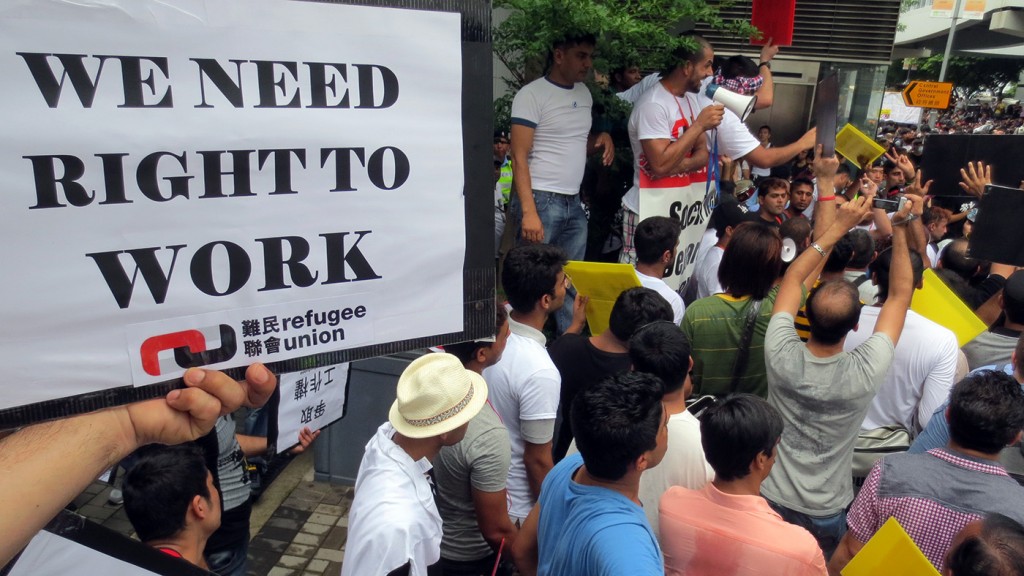
Vision First is often asked by government officials, journalist and members of the public we interact with: “Don’t most asylum seekers come here to work?” A cogent answer cannot be provided without acknowledging that economic motives generally overlap the asylum goals of those who migrate or flee to a developed country. The need to work does not establishes a black and white distinction between genuine and bogus refugees (terminology we reject), but rather it diffuses a thousand shades of gray over a vortex of interconnected modern lives.
Deep relationships with the refugee community, place Vision First before a broad picture of the asylum sphere which reveals that economic worries are on the whole as pressing as protection concerns across the ranks of all refugees, from newly arrived claimants, to those voluntarily departing, from accepted torture claimants to mandated UNHCR refugees awaiting resettlement. It seems that, like gravity, nobody can escape the unrelenting pull of economic forces.
The act of seeking asylum does not significantly divest refugees of prior financial needs, no matter how propaganda manipulates such a myth to separate those presumed more-legitimate from those gallingly maligned for abusing the system. Thus the answer is, “Yes, most asylum seekers need to work to generate necessary income like the majority of us.”
“But why do genuine refugees need to work?” is often the follow-up question by those who are not persuaded by the first answer. Refugees negotiate the harsh reality of living in a city in which policies are formulated to immiserate their livelihood. The welfare system barely meets half of refugees’ basic needs. In consequence, a small minority may rely upon handouts from a few churches and charities as a coping mechanism, but their number is necessarily very limited and resource-draining. By contrast, a large majority works to complement inadequate welfare and to preserve self-dignity and respect.
Further, even recognized torture claimants and refugees strive resolutely to honour duties towards faraway families and other obligations that international protection did not extinguish. It should be appreciated that few refugees are completely uprooted from the communities they once called home: they may have left spouses and children behind; they may need to support aging parents or sick relatives; they may endeavour to protect loved ones still in harm’s way.
Imagine for a moment being suddenly forced overseas without your family – never to return. Seeking asylum abroad does not sever overnight relationships and commitments established over decades, but only makes them harder and more distressing to manage. Besides, nobody moves to a developed country without being strained by constant financial requests from people left behind.
Another question is then, “I saw refugees selling their food. If they do so, it means they have enough assistance, right?” This is hardly so. Unfortunately money is still the issue. There are refugees who sell their food to pay for transportation, buy clothes or purchase culturally more appropriated foodstuff. The current in-kind welfare assistance does not provide credit for phone and even a 20$ reload card is expensive for those living off handouts.
Irrespective of the merits of individual cases (which are solely for Immigration to assess), in this day and age, it is simplistic to presume to remove economic motives from asylum, as if refugees were not deeply rooted in the money-driven reality that globalization has spread from pole to pole in the last sixty years. All refugees need to work, or somehow produce regular income, because they are not immune to structural economic demands in Hong Kong and possibly also back home.
The black and white distinction based on work is a myth circulated to separate ‘genuine’ refugees from ‘bogus’ ones. It is designed to raise suspicion against those who are perceived to be less desirable, with a view to discredit them. Contrary to popular belief, refugees are connected people and have to work like everyone else: some refugees may struggle under conditions of exploitation, a few may be more successful, but most of them are buffeted by economic forces nobody escapes.


